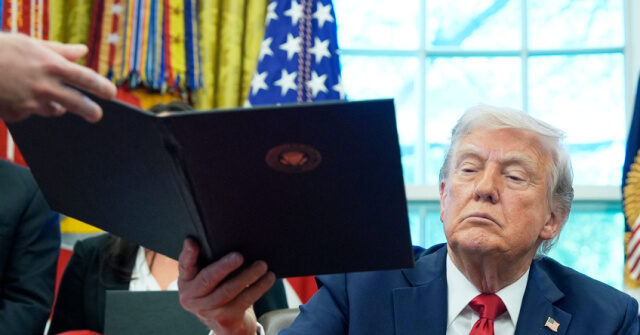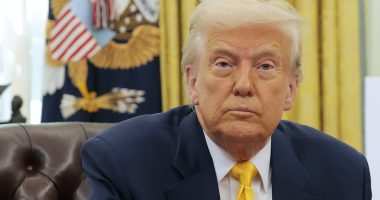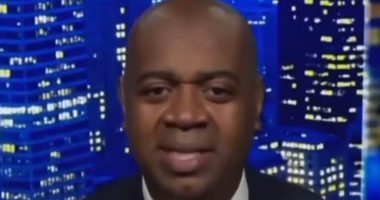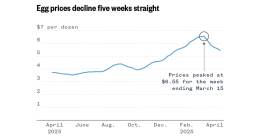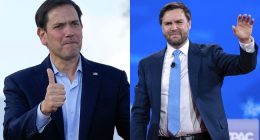Share this @internewscast.com
India’s government has just signed a deal with the United Kingdom that allows more Indian graduates to take more white-collar jobs from British graduates.
The deal is “truly appalling,” said Nigel Farage, leader of the fast-rising, anti-migration Reform UK party. The government has “betrayed working Britain” by giving Indian white-collar workers a 20 percent price advantage over similar Brits in jobs, he said.
But the deal is also bad news for American graduates because it may be similar to the still-secret trade deal that President Donald Trump is negotiating with Indian government officials.
“Hopefully, @POTUS and JDVance will not be willing to screw American workers in a US trade deal with India,” said a May 7 tweet from the Immigration Accountability Project.
“We’ve heard nothing out of this administration so far that would indicate to me they are serious about doing anything about employment visas that are displacing Americans,” said Kevin Lynn, founder of U.S. Tech Workers. He added:
We’re not seeing anything coming out of India saying that they’re aghast that the U.S. is looking to curb these employment visa programs.
Indian officials have been pressuring Trump to welcome many more mixed-skill Indian graduates into the U.S. white-collar jobs, many of which are already closed to Americans because of ethnic hiring networks created by Indian managers within the Fortune 500.
Also, U.S. lobbies welcome the Indian migrant workers because they provide India with billions of dollars in remittances needed to buy U.S. weapons, grain, energy, and technology that the U.S. hopes to sell via the trade deal. Under President Joe Biden, the U.S. dramatically expanded visa awards to Indians, including the B-1 visitor visas used by Indians to get truck-driving jobs in the United States.
So far, U.S. officials have remained tight-lipped about the pending U.S.-India deal.
Trump and his deputies — including Vice President JD Vance and top policy aide Stephen Miller — know the unpopularity of the Indian inflow of mixed-skilled, white-collar workers.
It is unpopular because millions of subservient foreign workers have been imported by companies to displace millions of American graduates in technology, engineering, management, finance, and increasingly in accounting. Top executives and investors import the workers via the multi-year H-1B, J-1, L-1, H4EAD, CPT, and OPT programs that dangle the promise of citizenship in front of desperate migrants.
For example, many young American graduates are being pushed out of career-starting jobs by the annual flood of roughly 300,000 foreign graduates who get work permits via the “F-1 Optional Practical Training” program. The program was created by President George W. Bush — without approval from Congress — and rewards companies that hire Indian graduates by exempting them from Social Security or Medicare taxes. It also allows foreign-born hiring managers to favor home-country job-seekers and to discriminate against American graduates.
At least 1.5 million white-collar jobs are now held by college-graduate migrants. In 2024, President Joe Biden’s deputies made it even easier for more Indian students to get white collars jobs.
Unsurprisingly, many recent or pending American graduates are alarmed and despondent over their failure to get jobs or even internships.
Computer professional Jim from Herndon told – that he has a nephew who graduated last year with a degree in engineering and computers, and a nephew who is about to graduate with a degree in Geographic Information Systems: “They found nothing, so they think they’ll be doing lifeguarding in the summer.”
Graduates “only have two years after they graduate to get a pipeline [career-starting job, and then [recruiters] move on to the next new grads,” he said. In contrast, his two nieces with degrees in sociology and film studies landed administration and marketing jobs for roughly $100,000, he added.
“Something strange, and potentially alarming, is happening to the job market for young, educated workers,” the Atlantic magazine reported in April:
According to the New York Federal Reserve, labor conditions for recent college graduates have “deteriorated noticeably” in the past few months, and the unemployment rate now stands at an unusually high 5.8 percent. Even newly minted M.B.A.s from elite programs are struggling to find work. Meanwhile, law-school applications are surging—an ominous echo of when young people used graduate school to bunker down during the great financial crisis.
The NAFTA-like displacement has also wrecked professionalism, productivity, and innovation in many U.S. companies, so helping China’s workforce to close the once-huge technology gap with America.
The workplace problems caused by the mixed-skill migrants are so bad that some companies are trying to reduce their reliance on the counterproductive Indian visa workers.
The concerns about a white-collar NAFTA rose this week when Trump told reporters that India has agreed to drop tariffs on U.S. goods to zero. “They’ll drop it to nothing,” Trump said in a White House media interaction alongside Canada’s Mark Carney. “They’ve already agreed.”
Reuters reported on May 9:
India has offered to slash its tariff gap with the U.S. to less than 4% from nearly 13% now, in exchange for an exemption from President Donald Trump’s “current and potential” tariff hikes, two sources said, as both nations move fast to clinch a deal.
Indians are unlikely to remove their tariffs without a U.S. concession — such as more white-collar jobs for Indian graduates, said Lynn. The Indians are “dropping tariffs to zero on American products that they have no intention of buying, and if they do, they’ll be buying with salaries taken from American [professionals],” he said.
India must demand more American jobs because its economic growth is built on its legal and illegal migrants who send remittances and outsourcing jobs back to India. The dependence on U.S. jobs was described in a May 5 article in Bloomberg:
“Everyone goes to the US to make money, and most of that money comes back to India,” says Jayesh Patel, whose entire family left the country. Patel, who runs a water bottling plant in Gujarat’s capital, Ahmedabad, frequently visits his native village to watch over the family’s land. “Everything here—the roads, temples, schools—it all comes from dollars.”
…
Mahindra Vithal Das, 65, who lives in Gujarat’s Mehsana district, has … two sons. Both made harrowing and expensive journeys to reach the US, where they work [illegally] in convenience stores and send money home to support Das and his wife.
However, in the talk with the Brits, the Indians dropped their demand for more migration because of pressure from Farage’s rising Reform UK party.
But their UK-India agreement also hides the tax-break gain that will likely allow more U.K. jobs to be taken from young British professionals and be given, at lower wages, to desperate Indian migrants delivered by multinational outsourcing companies.
The deal includes a huge “Double Contribution Convention” clause that allows Indian migrants to avoid paying a healthcare tax, dubbed the “National Insurance” tax. This tax giveaway ensures that British employers will hire low-tax Indians at less cost than Brits who must pay the tax as well as their higher college debts.
British officials insist the tax break is fair because it also would apply to any British people who were hired for jobs in India’s low-wage economy, and it only covers workers who hold jobs with transnational Indian companies.
Yet Indian officials are describing the deal as a “huge” win for their white-collar outsourcing industry: “In an unprecedented achievement, India has secured an exemption for Indian workers who are temporarily in the UK and their employers from paying social security contributions in the UK for a period of three years under the Double Contribution Convention. This will make Indian service providers significantly more competitive in the UK.”
The deal will also “greater global mobility for aspirational young Indians,” the pro-migration government declared, adding: “The FTA eases mobility for professionals including Contractual Service Suppliers; Business Visitors; Investors; Intra-Corporate Transferees; partners and dependent children of Intra-Corporate Transferees with right to work; and Independent Professionals like yoga instructors, musicians and chefs.”
The Indian officials say the deal will also help Indian companies sell services into the U.K. market: “India has secured significant commitments on digitally delivered services for Indian service suppliers, especially in professional services such as architecture and engineering, computer related services and telecommunication services.”
“The mobility chapter of the deal [is] meant to smooth the way for more inter-company transfers,” the Indian press release said, without directly saying that more Indian graduates will be able to take jobs and salaries from U.K. graduates.
In. D.C., U.S. officials have given little indication that they would welcome more Indian white-collar workers, and are promising to raise Americans’ productivity and wages.
“Over one in ten young adults in America are neither employed, in higher education, nor pursuing some sort of vocational training,” White House spokesman Kush Desai told Axios on May 7. “There is no shortage of American minds and hands to grow our labor force, and President Trump’s executive order to modernize workforce training programs represents this Administration’s commitment to capitalizing on that untapped potential,” he added.
The promise of cheap labor is ” a drug that too many American firms got addicted to … [and] globalization’s hunger for cheap labor is a problem precisely because it’s been bad for innovation,” Vance told investors at the American Dynamism Summit in March. He added:
Real innovation makes us more productive, but it also, I think, dignifies our workers. It boosts our standard of living. It strengthens our workforce and the relative value of its labor.
